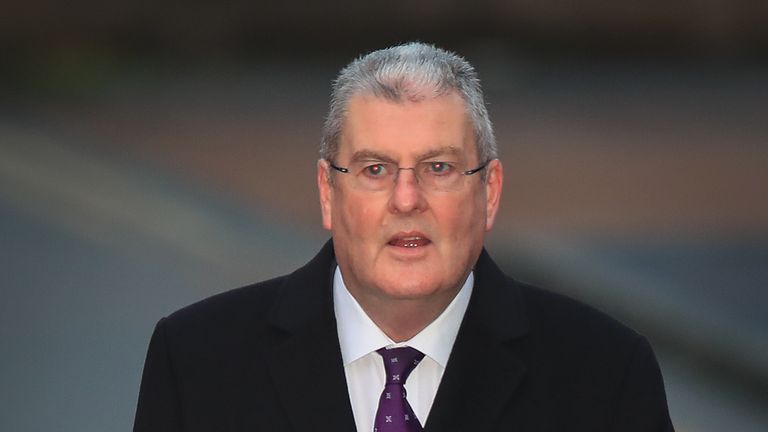Graham Mackrell 'flippant' over safety officer role at Hillsborough, trial hears
Wednesday 23 January 2019 20:05, UK
The former club secretary of Sheffield Wednesday said he would be too busy entertaining corporate clients to carry out the duties of a safety officer at Hillsborough, a court has heard.
Graham Mackrell was secretary and safety officer for the club at the time of the Hillsborough disaster, in which 96 Liverpool fans were fatally crushed on the Leppings Lane terrace at the FA Cup semi-final on April 15, 1989.
The 69-year-old, standing trial alongside match commander David Duckenfield, 74, is charged with safety offences.
Former environmental health officer David Moore told Preston Crown Court on Wednesday that the club had been reluctant to appoint a safety officer, despite it being a requirement in stadium safety manual the Green Guide.
Mr Moore, who worked for Sheffield City Council, said Mackrell's attitude was "flippant" when he discussed the need for an appointed safety officer at a "difficult" meeting in August 1987.
He said Mackrell had told him he would take on the role.
Mr Moore said: "The way he described that role to me, I wasn't sure he was serious about that role."
He told the jury he had asked Mackrell if he was prepared to carry out the activities of a safety officer, set out in the Green Guide, particularly on match days.
Mr Moore said: "I was quite surprised by his response. He told me very directly he would be too busy entertaining corporate clients."
Simon Antrobus QC, representing Mackrell, suggested Mr Moore might be wrong as Mackrell did not entertain guests on match days.
Mr Moore said: "I know he absolutely said that."
The former safety enforcement officer said the club had no safety management plan - a document which would set out in writing how it would manage safety - and it never delivered one, despite requests.
He also had concerns about contingency planning for safety stewards and the importance of first aiders.
He said: "I was quite surprised that arrangements for first aid appeared to be quite informal, at best."
But, in a report after the meeting, he recorded that he was impressed with the level of ground management at the stadium.
Mr Moore also said the club's structural engineer, Wilfred Eastwood, became "irate" when he pointed out "significant safety hazards" related to the club's development of the Spion Kop end.
"Dr Eastwood asked me details of those hazards and the relationship quickly deteriorated," he said.
Mackrell, of Stocking Pelham, Hertfordshire, denies contravening a term or condition of the stadium's safety certificate by failing to agree the methods of admission for the match, and failing to discharge a duty under the Health and Safety Act by not taking reasonable care in respect of arrangements for admission and the drawing up of contingency plans.
The court heard Sheffield City Council had been intending to update conditions of the ground's safety certificate since 1986, but at the time of the disaster, it had still not been updated.
David Bownes, former chief licensing officer for the council, said he did not know the reason for the delay.
He said: "It was a failing if there was inappropriate delay which can be shown by detailed evidence, which we don't have."
He accepted that annual compliance certificates from chartered engineers, which were a condition of the safety certificate, were not submitted from 1984 until 1986.
The 1988 certificate was submitted on May 10 1989, almost a month after the disaster.
Mr Bownes agreed that when the responsibility for the stadium's licence was handed to the city council from South Yorkshire County Council in 1986, no issues were raised about the Leppings Lane end.
He said: "There was certainly no indication of any danger that I was aware of."
Duckenfield, of Bournemouth, denies the gross negligence manslaughter of 95 Liverpool fans.
Under the law at the time, there can be no prosecution for the 96th victim, Tony Bland, as he died more than a year and a day after the disaster.



